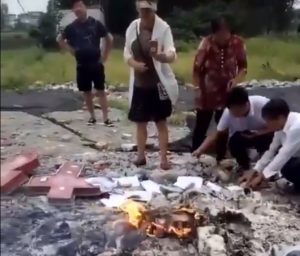China’s crackdown on religion has taken a significant turn over the last two months, reaching a sustained intensity not seen since the Cultural Revolution. Outside the Three-Self Patriotic Movement churches—the state-sanctioned Christian churches—Christians have been facing steadily increasing pressure for the last 10 years. In 2017, the crosses of hundreds of churches were removed in Zhejiang Province. Cameras and other monitoring devices were also installed in churches throughout the province.
The situation is not isolated to Christians. Authorities in the Xinjiang Uighur Autonomous Region have been working to develop and implement a massive electronic surveillance system straight out of Nineteen Eighty-Four, including facial and iris recognition, speech recognition software, and even DNA sampling. Chinese authorities have also instituted a reeducation program, detaining Uighurs in “reeducation camps” and even luring Uighur students studying abroad to return to China under false pretenses, only to be detained.
Tibetan Buddhists also face harassment, imprisonment, show trials, and persecution. According to the US Commission on International Religious Freedom, more than 4,700 Buddhist structures were destroyed in June 2017; in August 2017, 2,000 homes were destroyed.
Even with this situation as the backdrop, China’s actions in the last two months—which have included demolishing church structures, burning Bibles, closing house churches, arresting pastors, and forcing millions of Chinese Christians to sign statements renouncing their faith—represent a dramatic escalation in the Communist Party’s clampdown on religion in China.
A “Significant Escalation”
In the last two months, at least 4,000 crosses from the state-sanctioned Three-Self Patriotic Movement churches were forcefully demolished in Henan Province. There are signs that this government practice is being taken up by a dozen more provinces as well.

Bob Fu, a human rights activist and president of China Aid, has obtained footage of Bibles being burned in Henan Province. According to Fu, this is only the second time such a campaign has been carried out in the history of the People’s Republic of China. Another tactic not used since the Cultural Revolution is forced conversions. Not since 1966 have there been reports that the government has required Christians or members of other faiths to sign statements renouncing their basic religious beliefs under threat of losing jobs, income, or public benefits.
According to Fu, China’s actions in the last two months represents a “significant escalation on President Xi’s crackdown” on religious minorities. This is all the more remarkable considering the dismal starting point for religious freedom in China.
All Politics Is Local
All of this raises the question: Why crack down on religious communities, including even the state-sanctioned Three-Self Patriotic Movement?
China has long seen religion as a fifth column in the country, and in 2016 President Xi instituted a policy of “sinicization of religions,” that is, forcing local religions to adapt to Chinese socialism’s core values. President Xi apparently believes that Christianity, Islam, Tibetan Buddhism, and many other religions represent an existential threat to his power and hold on China.
Earlier this year, the National People’s Congress voted to remove the two-term limit for the presidency, paving the way for President Xi Jinping to remain in power for life. The vote was not particularly close. Of the 2,964 votes, two voted against and three abstained.
Moving Forward, What Can We do?
First, Christians should pray for our brothers and sisters in Christ in China. None of us in the West has faced the temptation to rationalize recanting our faith in the face of losing our livelihood or facing an open-ended prison term. None of us has feared for the safety of our families if we continue to faithfully preach the Gospel as we have been called by God to do. And so let us join in with the prayers of the body of Christ around the world and ask God to intervene in China and strengthen our brothers and sisters and provide relief.
Second, we should call upon the State Department to apply pressure. China was the subject of a country-specific statement at this summer’s Ministerial to Advance Religious Freedom. China remains on the State Department’s list of Countries of Particular Concern, a list of the worst violators of religious freedom around the world.
With a newly modernized International Religious Freedom Act, the State Department has a number of tools at its disposal, including diplomatic pressure, conditions on international aid and trade, and economic sanctions. China has been moving in an alarming direction for many years now, but this summer’s actions represent a dramatic lurch toward the extermination of religious communities.
Now is the time for the United States to build international opposition to China’s actions and to impose tangible consequences for the government’s actions. Because China is a growing power, this task will not be easy, but the United States must lead—before it is too late.
—
Travis Wussow is vice president for public policy and general counsel at the Ethics & Religious Liberty Commission of the Southern Baptist Convention (ERLC). Travis led the ERLC’s first international office located in the Middle East prior to joining the Washington, DC, office. He received a BBA in Finance from The University of Texas at Austin and a JD from The University of Texas School of Law.
Photo Credit: Chinese national flag in front of a church in Henan Province, via screenshot of Daily Mail video.






